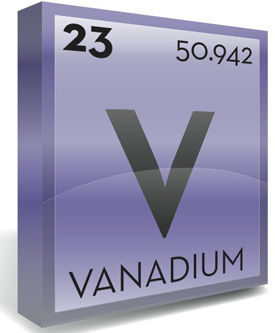 The link between vanadium and diabetes is both tenuous and possibly promising all at the same time. So far though, the reality has not lived up to the hype.
The link between vanadium and diabetes is both tenuous and possibly promising all at the same time. So far though, the reality has not lived up to the hype.
Many health practitioners classify vanadium as a nonessential nutrient or one that is only needed in very small quantities.
In fact, no human deficiency of vanadium is known, meaning if you don’t get enough of it, so what. Moreover, there is no “daily recommended allowance” advocated by the government. Nonetheless, the discussion of vanadium as a method for controlling blood sugar levels continues to stick around. Why is that?
Years ago, about a half dozen or so small clinical studies found promising results for using vanadium to control blood glucose levels and one study even found that type 1 diabetics were able to reduce their insulin requirements after only two full weeks of treatment.
Three small studies reported decreased fasting blood glucose levels. Two of these three also reported lower A1c results. Two additional studies also supported these findings.
Scientists are quick to note however, that further research is needed to support these smaller studies, despite initial results that were highly suggestive of positive outcome for using vanadium as a glucose control method.
POSSIBLE TOXIC SIDE EFFECTS
The bigger problem with most of these studies is that the amount of vanadium used could be very toxic to humans. Different forms of any given nutritional supplement deliver different amounts of the supplement. For example, vanadium can come in multiple forms, such as vanadate and vanadyl sulfate. Each of these forms will deliver a different amount of vanadium. The amount of vanadium that is actually delivered to your body is called the elemental amount.
Bottom line is that the Upper Limit of vanadium is set at 1.8 mg of elemental vanadium per day. The amounts in the studies were far in excess of the upper limit amount. Thus, it is unclear if taking these elevated amounts long term would do significantly more harm than good.
So, for the time being, it is not recommended that you take vanadium supplements. You can get more than enough through your normal diet. Foods that contain vanadium include shellfish, whole grains, mushrooms and various spices.
Sources:
Gloria Y. Yeh, David M. Eisenberg, Ted J. Kaptchuk, and Russell S. Phillips, Systematic Review of Herbs and Dietary Supplements for Glycemic Control in Diabetes, Diabetes Care 26: 1277-1294.
CAM and Diabetes: A Focus on Dietary Supplements, National Center for Alternative and Complementary Medicine, NNCACM Publication No. D416, June 2008.
By Erich Schultz – Last Reviewed May 2013.
